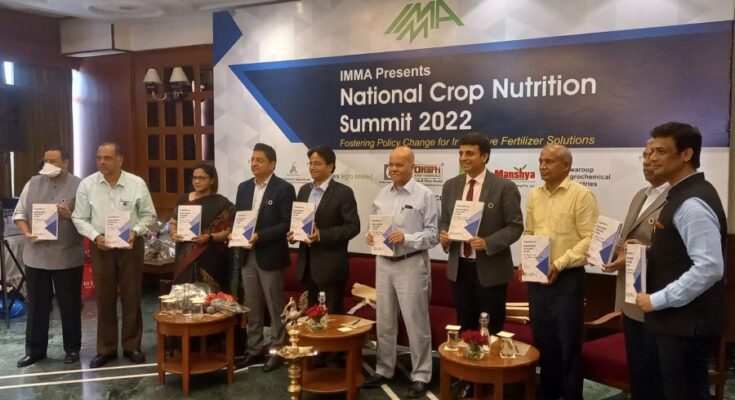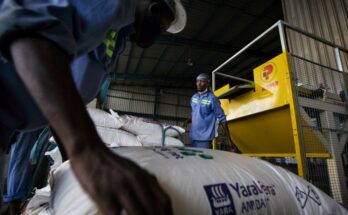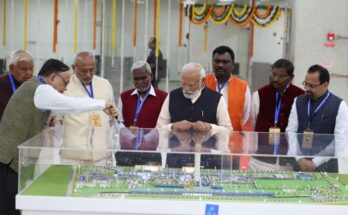The Indian Micro-Fertilizers Manufacturers Association (IMMA) on Friday welcomed the Draft Integrated Plant Nutrition Management Bill 2022 to regulate the fertiliser sector. With the Draft Integrated Plant Nutrition Management Bill 2022 promoting label claim based innovative fertilisers, the stage is set for unleashing rapid innovation in the speciality crop nutrition sector in India. IMMA however urged the government to control the prices of only those nutrients where subsidy is being provided and not to control the rates of micronutrients and specialised fertilisers.
In this context, IMMA organised the third edition of the National Crop Nutrition Summit with all stakeholders including government, industry bodies, agricultural input companies, farmers and agricultural input dealers who were in attendance from across India.
“While the move is welcome, the industry needs to begin a constructive dialogue on this radical policy shift and set up checks and balances to ensure that farmers receive quality agricultural inputs and accurately understand the agro-economic benefits of using the new-age fertilisers,” said Dr Rahul Mirchandani, president, Indian Micro-Fertilisers Manufacturers Association (IMMA). “This summit is aimed at building a constructive dialogue along with this theme and document industry and stakeholder views for the presentation of a communique to the Government, after extensive deliberations,” he added.
Speaking on the occasion, Dr RK Tewatia, Director- Agriculture Sciences, Fertilizer Association of India said, “There is a need for different chapters in the IPNM Bill 2022 for subsidised and non-subsidised fertilisers. Provisions to enable ease of doing business are essential to support the industry.” He further said, “General specifications for label claim fertilisers should be prepared by a technical committee with representatives included from the micronutrient industry. This will solve more than half of the industry’s problems to bring new innovations to farmers.”
Over 50 industry stakeholders, Government officials from the Ministry of Agriculture, Department of Fertilizers and representatives from other industry associations attended the IMMA National Crop Nutrition Summit at the India Habitat Centre, New Delhi.
You may also like to read: B2B e-commerce platform nurture.retail partners with agrochemical company – AgFarm
The Indian Micro-Fertilizers Manufacturers Association (IMMA) was established in 1983 to represent the interests of the micronutrient manufacturers throughout the country. Sameer Pathare, Vice President, IMMA, said, “Our members have been working with the farming communities for almost 50 years and have played a vital role in making balanced plant nutrition a national imperative. IMMA has three major focus areas of work: Policy advocacy with Government, knowledge and skills training of staff and stakeholders across India, as well as developing unity and fellowship amongst members.”
The event invited speakers from including Dr. AK Singh, Agriculture Commissioner, Government of India; Dr. SK Malhotra, Project Director, Directorate of Knowledge Management in Agriculture, ICAR; Priya Ranjan, Jt. Secretary – Integrated Nutrient Management; Dr. Suresh Kumar Chaudhari, Deputy Director General (Natural Resource Management), ICAR; Dr. Suneeti Toteja, Bureau of Indian Standards; Dr. Pushplata Singh, Director, TERI–Deakin Nano Biotechnology Centre, amongst others.
In addition to IMMA members, who represent the micronutrient fertiliser industry from across India.
The participants made the following key suggestions
- Label claim norms for new innovative fertilisers must be developed with a technical committee, including representatives from the micronutrient and speciality fertilisers. Analytical methods also to be standardised.
- Price management to be restricted to subsidised items only and not on micronutrients and bio-stimulants.
- State grades of micronutrient combinations to be reconsidered depending on the current soil conditions.
- Custom duty to be regularised as per end-use for imported raw materials.
- State government labs to be sufficiently equipped in terms of infrastructure and qualified manpower.
- Clarity on exports.
The IMMA National Crop Nutrition Summit concluded with the presentation of a communique that was put together to consolidate the day-long deliberations into a comprehensive document containing a set of recommendations made by the various stakeholders on two very crucial policy changes that will affect the entire speciality crop nutrition industry – the new Integrated Plant Nutrition Bill and Innovative, Label claim fertilisers.





